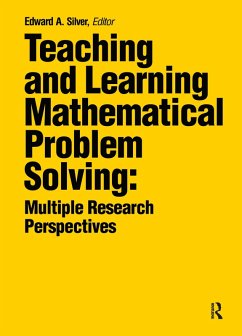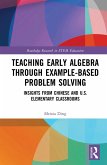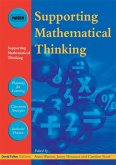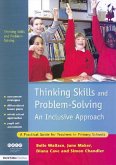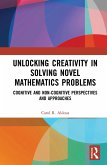Teaching and Learning Mathematical Problem Solving (eBook, ePUB)
Multiple Research Perspectives
Redaktion: Silver, Edward A.
88,95 €
88,95 €
inkl. MwSt.
Sofort per Download lieferbar

44 °P sammeln
88,95 €
Als Download kaufen

88,95 €
inkl. MwSt.
Sofort per Download lieferbar

44 °P sammeln
Jetzt verschenken
Alle Infos zum eBook verschenken
88,95 €
inkl. MwSt.
Sofort per Download lieferbar
Alle Infos zum eBook verschenken

44 °P sammeln
Teaching and Learning Mathematical Problem Solving (eBook, ePUB)
Multiple Research Perspectives
Redaktion: Silver, Edward A.
- Format: ePub
- Merkliste
- Auf die Merkliste
- Bewerten Bewerten
- Teilen
- Produkt teilen
- Produkterinnerung
- Produkterinnerung

Bitte loggen Sie sich zunächst in Ihr Kundenkonto ein oder registrieren Sie sich bei
bücher.de, um das eBook-Abo tolino select nutzen zu können.
Hier können Sie sich einloggen
Hier können Sie sich einloggen
Sie sind bereits eingeloggt. Klicken Sie auf 2. tolino select Abo, um fortzufahren.

Bitte loggen Sie sich zunächst in Ihr Kundenkonto ein oder registrieren Sie sich bei bücher.de, um das eBook-Abo tolino select nutzen zu können.
A provocative collection of papers containing comprehensive reviews of previous research, teaching techniques, and pointers for direction of future study. Provides both a comprehensive assessment of the latest research on mathematical problem solving, with special emphasis on its teaching, and an attempt to increase communication across the active disciplines in this area.
- Geräte: eReader
- mit Kopierschutz
- eBook Hilfe
- Größe: 20.83MB
Andere Kunden interessierten sich auch für
![Teaching Mathematics Through Problem-Solving (eBook, ePUB) Teaching Mathematics Through Problem-Solving (eBook, ePUB)]() Akihiko TakahashiTeaching Mathematics Through Problem-Solving (eBook, ePUB)44,95 €
Akihiko TakahashiTeaching Mathematics Through Problem-Solving (eBook, ePUB)44,95 €![Teaching Early Algebra through Example-Based Problem Solving (eBook, ePUB) Teaching Early Algebra through Example-Based Problem Solving (eBook, ePUB)]() Meixia DingTeaching Early Algebra through Example-Based Problem Solving (eBook, ePUB)38,95 €
Meixia DingTeaching Early Algebra through Example-Based Problem Solving (eBook, ePUB)38,95 €![Supporting Mathematical Thinking (eBook, ePUB) Supporting Mathematical Thinking (eBook, ePUB)]() Supporting Mathematical Thinking (eBook, ePUB)17,95 €
Supporting Mathematical Thinking (eBook, ePUB)17,95 €![Pedagogy for Creative Problem Solving (eBook, ePUB) Pedagogy for Creative Problem Solving (eBook, ePUB)]() Peter MerrotsyPedagogy for Creative Problem Solving (eBook, ePUB)38,95 €
Peter MerrotsyPedagogy for Creative Problem Solving (eBook, ePUB)38,95 €![Teaching Problem-Solving and Thinking Skills through Science (eBook, ePUB) Teaching Problem-Solving and Thinking Skills through Science (eBook, ePUB)]() Belle WallaceTeaching Problem-Solving and Thinking Skills through Science (eBook, ePUB)33,95 €
Belle WallaceTeaching Problem-Solving and Thinking Skills through Science (eBook, ePUB)33,95 €![Thinking Skills and Problem-Solving - An Inclusive Approach (eBook, ePUB) Thinking Skills and Problem-Solving - An Inclusive Approach (eBook, ePUB)]() Belle WallaceThinking Skills and Problem-Solving - An Inclusive Approach (eBook, ePUB)33,95 €
Belle WallaceThinking Skills and Problem-Solving - An Inclusive Approach (eBook, ePUB)33,95 €![Unlocking Creativity in Solving Novel Mathematics Problems (eBook, ePUB) Unlocking Creativity in Solving Novel Mathematics Problems (eBook, ePUB)]() Carol AldousUnlocking Creativity in Solving Novel Mathematics Problems (eBook, ePUB)40,95 €
Carol AldousUnlocking Creativity in Solving Novel Mathematics Problems (eBook, ePUB)40,95 €-
-
-
A provocative collection of papers containing comprehensive reviews of previous research, teaching techniques, and pointers for direction of future study. Provides both a comprehensive assessment of the latest research on mathematical problem solving, with special emphasis on its teaching, and an attempt to increase communication across the active disciplines in this area.
Dieser Download kann aus rechtlichen Gründen nur mit Rechnungsadresse in A, B, BG, CY, CZ, D, DK, EW, E, FIN, F, GR, HR, H, IRL, I, LT, L, LR, M, NL, PL, P, R, S, SLO, SK ausgeliefert werden.
Produktdetails
- Produktdetails
- Verlag: Taylor & Francis eBooks
- Seitenzahl: 484
- Erscheinungstermin: 3. April 2013
- Englisch
- ISBN-13: 9781136561238
- Artikelnr.: 38270507
- Verlag: Taylor & Francis eBooks
- Seitenzahl: 484
- Erscheinungstermin: 3. April 2013
- Englisch
- ISBN-13: 9781136561238
- Artikelnr.: 38270507
- Herstellerkennzeichnung Die Herstellerinformationen sind derzeit nicht verfügbar.
Edward A. Silver
Part A. Problem-Solving Research: Mathematics Education Perspectives. A
Retrospective Account of the Past Twenty-five Years of Research on Teaching
Mathematical Problem Solving; Learning to Add and Subtract: An Exercise in
Problem Solving; Methodological Considerations in Research on Mathematical
Problem-Solving Instruction; Mathematical Problem Solving: Lessons from the
British Experience; Part B. Problem-Solving Research: Cross-Discipline
Perspectives; Implications for Mathematics Instruction of Research on
Scientific Problem Solving; Thinking Scientifically and Thinking
Mathematically: A Discussion of the Paper by Heller and Hungate;
Implications of Cognitive Psychology for Instruction in Mathematical
Problem Solving; Cognitive Psychology and Mathematical Problem Solving: A
Discussion of Mayer's Paper; Artificial Intelligence and the Learning of
Mathematics: A Tutorial Sampling; Artificial Intelligence and Mathematics
Education: A Discussion of Rissland's Paper; Experience, Problem Solving,
and Learning Mathematics: Considerations in Developing Mathematics
Curricula; Cognitive Theory and Curriculum Design: A Discussion of
Thompson's Paper; Part C. Problem-Solving Research: Themes and Directions
Research on Teaching Mathematical Problem Solving: Some Underrepresented
Themes and Needed Directions; Affective Issues in Research on Teaching
Mathematical Problem Solving; Teacher's Conceptions of Mathematics and the
Teaching of Problem Solving; The Teacher and Classroom Instruction:
Neglected Themes in Problem-Solving Research; Conceptual Analyses of
Problem-Solving Performance; Individual Differences and Mathematical
Problem Solving; Small Groups as a Setting for Research on Mathematical
Problem Solving; Metacognitive and Epistemological Issues in Mathematical
Understanding; Representation and Problem Solving: Methodological Issues
Related to Modeling; Problem-Solving Derailers: The Influence of
Misconceptions on Problem[1]Solving Performance; Computers in Research on
Mathematical Problem Solving
Retrospective Account of the Past Twenty-five Years of Research on Teaching
Mathematical Problem Solving; Learning to Add and Subtract: An Exercise in
Problem Solving; Methodological Considerations in Research on Mathematical
Problem-Solving Instruction; Mathematical Problem Solving: Lessons from the
British Experience; Part B. Problem-Solving Research: Cross-Discipline
Perspectives; Implications for Mathematics Instruction of Research on
Scientific Problem Solving; Thinking Scientifically and Thinking
Mathematically: A Discussion of the Paper by Heller and Hungate;
Implications of Cognitive Psychology for Instruction in Mathematical
Problem Solving; Cognitive Psychology and Mathematical Problem Solving: A
Discussion of Mayer's Paper; Artificial Intelligence and the Learning of
Mathematics: A Tutorial Sampling; Artificial Intelligence and Mathematics
Education: A Discussion of Rissland's Paper; Experience, Problem Solving,
and Learning Mathematics: Considerations in Developing Mathematics
Curricula; Cognitive Theory and Curriculum Design: A Discussion of
Thompson's Paper; Part C. Problem-Solving Research: Themes and Directions
Research on Teaching Mathematical Problem Solving: Some Underrepresented
Themes and Needed Directions; Affective Issues in Research on Teaching
Mathematical Problem Solving; Teacher's Conceptions of Mathematics and the
Teaching of Problem Solving; The Teacher and Classroom Instruction:
Neglected Themes in Problem-Solving Research; Conceptual Analyses of
Problem-Solving Performance; Individual Differences and Mathematical
Problem Solving; Small Groups as a Setting for Research on Mathematical
Problem Solving; Metacognitive and Epistemological Issues in Mathematical
Understanding; Representation and Problem Solving: Methodological Issues
Related to Modeling; Problem-Solving Derailers: The Influence of
Misconceptions on Problem[1]Solving Performance; Computers in Research on
Mathematical Problem Solving
Part A. Problem-Solving Research: Mathematics Education Perspectives. A
Retrospective Account of the Past Twenty-five Years of Research on Teaching
Mathematical Problem Solving; Learning to Add and Subtract: An Exercise in
Problem Solving; Methodological Considerations in Research on Mathematical
Problem-Solving Instruction; Mathematical Problem Solving: Lessons from the
British Experience; Part B. Problem-Solving Research: Cross-Discipline
Perspectives; Implications for Mathematics Instruction of Research on
Scientific Problem Solving; Thinking Scientifically and Thinking
Mathematically: A Discussion of the Paper by Heller and Hungate;
Implications of Cognitive Psychology for Instruction in Mathematical
Problem Solving; Cognitive Psychology and Mathematical Problem Solving: A
Discussion of Mayer's Paper; Artificial Intelligence and the Learning of
Mathematics: A Tutorial Sampling; Artificial Intelligence and Mathematics
Education: A Discussion of Rissland's Paper; Experience, Problem Solving,
and Learning Mathematics: Considerations in Developing Mathematics
Curricula; Cognitive Theory and Curriculum Design: A Discussion of
Thompson's Paper; Part C. Problem-Solving Research: Themes and Directions
Research on Teaching Mathematical Problem Solving: Some Underrepresented
Themes and Needed Directions; Affective Issues in Research on Teaching
Mathematical Problem Solving; Teacher's Conceptions of Mathematics and the
Teaching of Problem Solving; The Teacher and Classroom Instruction:
Neglected Themes in Problem-Solving Research; Conceptual Analyses of
Problem-Solving Performance; Individual Differences and Mathematical
Problem Solving; Small Groups as a Setting for Research on Mathematical
Problem Solving; Metacognitive and Epistemological Issues in Mathematical
Understanding; Representation and Problem Solving: Methodological Issues
Related to Modeling; Problem-Solving Derailers: The Influence of
Misconceptions on Problem[1]Solving Performance; Computers in Research on
Mathematical Problem Solving
Retrospective Account of the Past Twenty-five Years of Research on Teaching
Mathematical Problem Solving; Learning to Add and Subtract: An Exercise in
Problem Solving; Methodological Considerations in Research on Mathematical
Problem-Solving Instruction; Mathematical Problem Solving: Lessons from the
British Experience; Part B. Problem-Solving Research: Cross-Discipline
Perspectives; Implications for Mathematics Instruction of Research on
Scientific Problem Solving; Thinking Scientifically and Thinking
Mathematically: A Discussion of the Paper by Heller and Hungate;
Implications of Cognitive Psychology for Instruction in Mathematical
Problem Solving; Cognitive Psychology and Mathematical Problem Solving: A
Discussion of Mayer's Paper; Artificial Intelligence and the Learning of
Mathematics: A Tutorial Sampling; Artificial Intelligence and Mathematics
Education: A Discussion of Rissland's Paper; Experience, Problem Solving,
and Learning Mathematics: Considerations in Developing Mathematics
Curricula; Cognitive Theory and Curriculum Design: A Discussion of
Thompson's Paper; Part C. Problem-Solving Research: Themes and Directions
Research on Teaching Mathematical Problem Solving: Some Underrepresented
Themes and Needed Directions; Affective Issues in Research on Teaching
Mathematical Problem Solving; Teacher's Conceptions of Mathematics and the
Teaching of Problem Solving; The Teacher and Classroom Instruction:
Neglected Themes in Problem-Solving Research; Conceptual Analyses of
Problem-Solving Performance; Individual Differences and Mathematical
Problem Solving; Small Groups as a Setting for Research on Mathematical
Problem Solving; Metacognitive and Epistemological Issues in Mathematical
Understanding; Representation and Problem Solving: Methodological Issues
Related to Modeling; Problem-Solving Derailers: The Influence of
Misconceptions on Problem[1]Solving Performance; Computers in Research on
Mathematical Problem Solving
